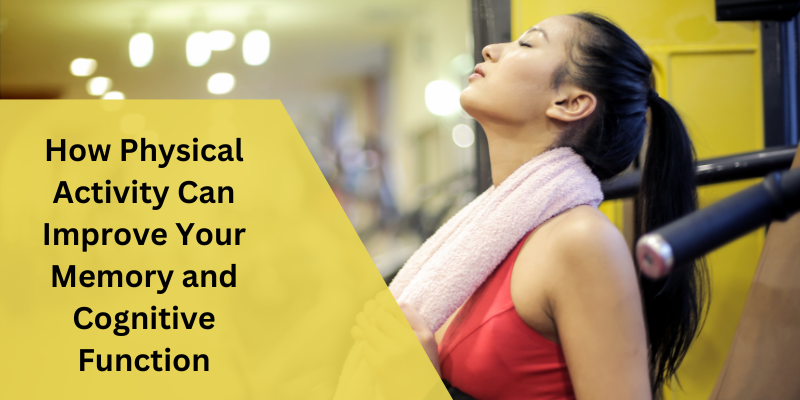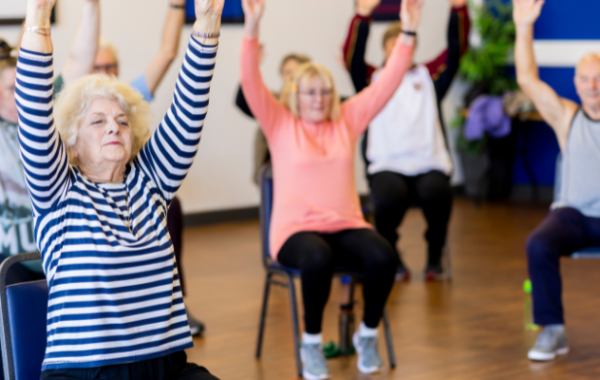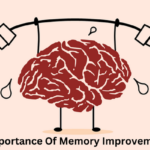The Connection Between Exercise and Memory: How Physical Activity Can Improve Your Memory and Cognitive Function

Welcome to the connection between exercise and memory post. Physical exercise has numerous benefits for the human body. Among these benefits is its positive impact on memory and cognitive function. Regular physical activity can improve various aspects of cognitive function, including memory, attention, and decision-making. In this article, we will explore the connection between exercise and memory, how physical activity can improve your memory and cognitive function, and the scientific evidence behind it.
Introduction
Memory is an essential cognitive function that allows us to store and retrieve information from our past experiences. It is vital to our everyday lives and plays a significant role in our ability to learn, reason, and make decisions. However, as we age, our memory and cognitive function can decline, leading to a range of problems, including dementia and other cognitive impairments. Fortunately, regular physical exercise has been shown to have numerous positive effects on memory and cognitive function, and may help to prevent or delay cognitive decline.
The Basics of Memory
Before diving into the connection between exercise and memory, it is essential to understand the basics of how memory works. Memory is divided into two main types: short-term memory and long-term memory. Short-term memory is temporary and lasts only a few seconds to a few minutes. It is used to store and manipulate information for a brief period, such as remembering a phone number or an address.
Long-term memory, on the other hand, is more permanent and can last anywhere from a few hours to a lifetime. It is used to store and retrieve information from our past experiences, such as remembering a childhood memory or a favorite song.
Memory is a crucial aspect of human cognition, allowing us to learn and retain information, and make decisions based on past experiences. Here are some basic facts about memory:
- Memory can be divided into different types, such as sensory memory, short-term memory, and long-term memory.
- Sensory memory refers to the initial processing of sensory information, such as sights, sounds, and smells.
- Short-term memory, also known as working memory, is where we hold and manipulate information for a short period of time, such as remembering a phone number.
- Long-term memory is where we store information for longer periods of time, ranging from days to years, and includes both declarative and procedural memory.
- Declarative memory refers to memory of facts and events, while procedural memory refers to memory of how to perform tasks and skills.
- Memory is not a perfect recording of experiences, but is instead a constructive process that is influenced by prior knowledge, emotions, and expectations.
- Memory can be influenced by a variety of factors, including age, stress, sleep, and physical exercise.
- Memory is essential for learning and decision-making, and understanding how memory works can help us optimize our learning strategies and improve our cognitive abilities.
Unlock Your Brain’s Potential with Neurodrine: The All-Natural Way to Boost Mental Clarity
Exercise and Brain Function

Physical exercise has numerous benefits for the human body, including improving cardiovascular health, building muscle mass, and reducing the risk of chronic diseases such as diabetes and heart disease. However, exercise also has a positive impact on brain function. Exercise has been shown to increase blood flow and oxygen to the brain, stimulate the growth of new neurons, and increase the production of various chemicals in the brain that are essential for cognitive function, such as neurotransmitters and growth factors.
The Effects of Exercise on Memory
The positive effects of exercise on memory and cognitive function have been demonstrated in numerous studies. For example, a study published in the journal “Neurology” found that regular aerobic exercise, such as jogging or cycling, can improve cognitive function in older adults. Another study published in the “Journal of Alzheimer’s Disease” found that regular exercise can improve memory and cognitive function in individuals with mild cognitive impairment, a condition that often precedes Alzheimer’s disease.
Types of Exercise for Memory Improvement
While any type of physical exercise can have positive effects on memory and cognitive function, some types of exercise may be more effective than others. For example, aerobic exercise, such as running or cycling, has been shown to be particularly effective at improving memory and cognitive function.
Resistance training, such as weightlifting, may also have some benefits for cognitive function, although the evidence is less clear. Additionally, activities that require coordination, balance, and spatial awareness, such as dance or yoga, may also be beneficial for memory and cognitive function. Cognitive stimulation activities are activities that are designed to engage and challenge the brain, helping to improve cognitive function and potentially reduce the risk of cognitive decline.
Recommended Exercise Frequency and Duration
To improve memory and cognitive function, it is recommended to engage in regular exercise with a certain frequency and duration. Here are some key points to keep in mind:
- Aim for at least 30 minutes of moderate-intensity aerobic exercise on most days of the week, such as brisk walking, cycling, swimming, or dancing.
- Resistance training and flexibility exercises can also be incorporated into a well-rounded exercise routine.
- Gradually increase the intensity and duration of exercise over time to avoid injury and improve fitness levels.
- Consult with a healthcare provider before starting a new exercise program, especially if you have any medical conditions or concerns.
The Impact of Age on Exercise and Memory

Age can have a significant impact on the relationship between exercise and memory. As we age, our brain function and cognitive abilities naturally decline, making it more difficult to maintain memory and cognitive function. However, regular physical exercise has been shown to improve cognitive function and memory in older adults, making it a valuable tool for preventing or delaying cognitive decline.
Unlock Your Brain’s Potential with Neurodrine: The All-Natural Way to Boost Mental Clarity
Combining Exercise and Other Memory-Enhancing Activities
Combining exercise with other memory-enhancing activities can be an effective way to boost cognitive function and memory. Some activities that can be combined with exercise for maximum benefit include:
- Mindfulness meditation: Practicing mindfulness meditation has been shown to improve attention, working memory, and executive function.
- Mental stimulation: Engaging in mentally stimulating activities such as reading, doing puzzles, or learning a new skill can help keep the brain active and improve memory.
- Sleep: Getting enough quality sleep is important for memory consolidation and overall cognitive function.
- Healthy diet: Eating a balanced diet that includes foods rich in antioxidants and omega-3 fatty acids can support brain health.
When combined with regular exercise, these activities can enhance memory and cognitive function in individuals of all ages. It is important to consult with a healthcare provider before starting any new exercise or wellness program.
How to Start an Exercise Routine for Memory Improvement
Starting an exercise routine for memory improvement can be challenging, especially if you are not used to regular physical activity. However, there are several steps you can take to make it easier. First, choose an activity that you enjoy and that is appropriate for your fitness level. Second, start slowly and gradually increase the duration and intensity of your exercise over time. Finally, make exercise a habit by scheduling it into your daily routine.
Factors to Consider When Starting an Exercise Routine
When starting an exercise routine to improve memory and cognitive function, it is important to consider the following factors:
- Age and fitness level: Choose exercises that are appropriate for your age and fitness level, and gradually increase the intensity and duration over time.
- Health conditions: Consult with a healthcare provider before starting a new exercise program, especially if you have any underlying health conditions or injuries.
- Personal preferences: Choose exercises that you enjoy and that fit into your lifestyle, such as walking, swimming, or yoga.
- Safety: Choose a safe environment for exercise, wear appropriate clothing and footwear, and stay hydrated.
- Consistency: Aim to exercise on a regular basis, even if it is just for short periods of time, to build a consistent routine and achieve the greatest benefits for memory and cognitive function.
Tips for Staying Motivated
Staying motivated is one of the biggest challenges when it comes to starting and maintaining an exercise routine. Here are some tips to help you stay motivated:
- Set specific, achievable goals: Whether it’s running a 5k or being able to do 10 push-ups, having a clear goal in mind can keep you focused and motivated.
- Find a workout buddy: Having a friend to exercise with can make the experience more enjoyable and hold you accountable.
- Mix up your routine: Doing the same exercises every day can get boring quickly. Try new activities or switch up your routine to keep things fresh and exciting.
- Reward yourself: Celebrate your progress and accomplishments by treating yourself to something you enjoy, like a massage or a favorite meal.
- Track your progress: Keep a record of your workouts and progress to see how far you’ve come and motivate yourself to keep going.
Common Misconceptions about Exercise and Memory Improvement
There are several common misconceptions about exercise and memory improvement. For example, some people believe that only intense exercise is effective for improving memory and cognitive function. However, any type of physical activity can have a positive impact on memory and cognitive function. Additionally, some people believe that memory and cognitive function cannot be improved with age. However, regular physical exercise can improve cognitive function and memory in older adults.
Frequently Asked Questions
Q: Can exercise improve memory in individuals with Alzheimer’s disease?
A: While exercise cannot cure Alzheimer’s disease, it can still be beneficial for individuals with the disease. Regular physical activity has been shown to improve overall cognitive function, reduce the risk of falls and injuries, and improve quality of life in individuals with Alzheimer’s disease.
Q: How soon can you expect to see improvements in memory and cognitive function from exercise?
A: The timing of improvements in memory and cognitive function from exercise can vary depending on factors such as age, fitness level, and the type and frequency of exercise. Some studies have shown improvements in cognitive function after just a few weeks of regular exercise, while others have shown improvements after several months.
Q: What types of exercise are best for improving memory and cognitive function?
A: Any type of physical activity can have a positive impact on memory and cognitive function. However, aerobic exercise such as brisk walking, cycling, swimming, or dancing has been shown to be particularly beneficial for improving cognitive function and memory.
Q: Can combining exercise with other memory-enhancing activities improve memory and cognitive function?
A: Yes, combining exercise with other memory-enhancing activities such as practicing mindfulness meditation, engaging in mentally stimulating activities such as reading or puzzles, and getting enough sleep can all contribute to better memory and cognitive function.
Q: Is it ever too late to start exercising for memory improvement?
A: No, it is never too late to start exercising for memory improvement. Regular physical exercise can improve cognitive function and memory in individuals of all ages, including older adults.
The Connection Between Exercise and Memory Conclusion
In conclusion, the connection between exercise and memory is a powerful one that cannot be ignored. Multiple studies have demonstrated that regular physical activity can improve cognitive function, boost memory, and reduce the risk of cognitive decline in individuals of all ages. The type and frequency of exercise can vary based on individual fitness levels and goals, but aerobic exercise such as brisk walking, cycling, swimming, or dancing has been shown to be particularly effective for improving cognitive function and memory.
It is important to note that exercise alone is not a cure for memory impairment or dementia, but it can help slow down the decline and improve overall quality of life. Combining exercise with other memory-enhancing activities such as practicing mindfulness meditation, engaging in mentally stimulating activities, and getting enough sleep can also contribute to better memory and cognitive function.
It is never too late to start exercising for memory improvement, and incorporating regular physical activity into your daily routine can lead to a healthier and more fulfilling life. By prioritizing exercise and making it a regular part of your routine, you can take control of your cognitive health and enjoy the benefits of a sharper mind and better memory for years to come.




